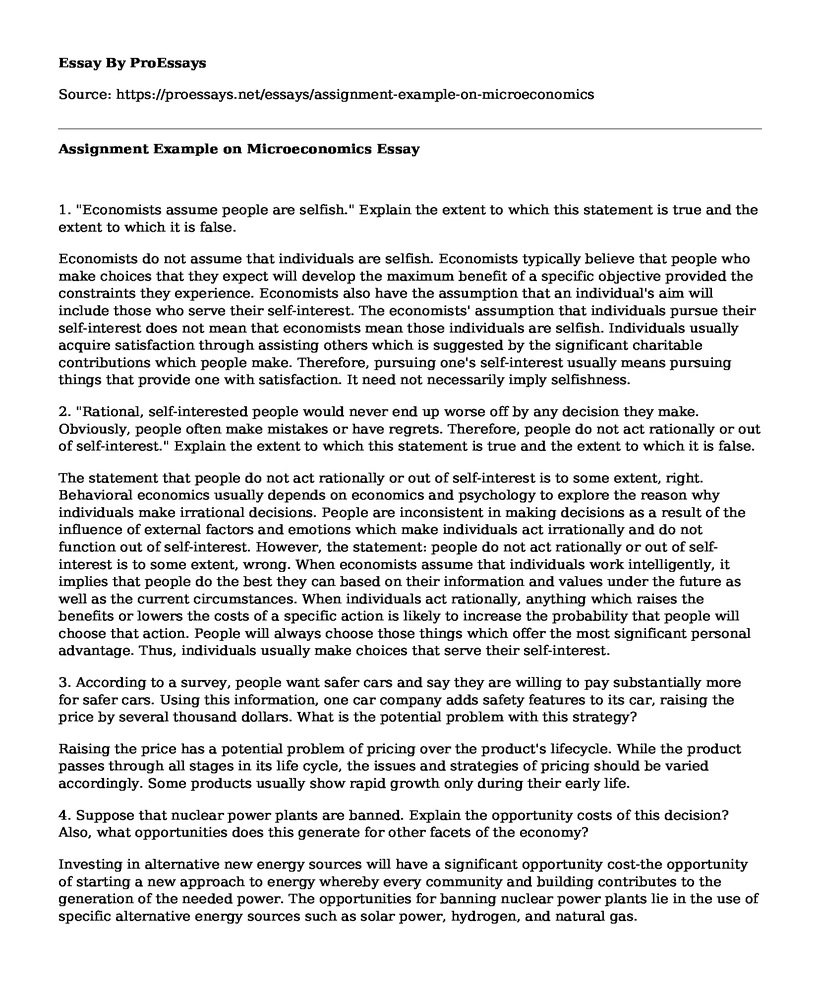1. "Economists assume people are selfish." Explain the extent to which this statement is true and the extent to which it is false.
Economists do not assume that individuals are selfish. Economists typically believe that people who make choices that they expect will develop the maximum benefit of a specific objective provided the constraints they experience. Economists also have the assumption that an individual's aim will include those who serve their self-interest. The economists' assumption that individuals pursue their self-interest does not mean that economists mean those individuals are selfish. Individuals usually acquire satisfaction through assisting others which is suggested by the significant charitable contributions which people make. Therefore, pursuing one's self-interest usually means pursuing things that provide one with satisfaction. It need not necessarily imply selfishness.
2. "Rational, self-interested people would never end up worse off by any decision they make. Obviously, people often make mistakes or have regrets. Therefore, people do not act rationally or out of self-interest." Explain the extent to which this statement is true and the extent to which it is false.
The statement that people do not act rationally or out of self-interest is to some extent, right. Behavioral economics usually depends on economics and psychology to explore the reason why individuals make irrational decisions. People are inconsistent in making decisions as a result of the influence of external factors and emotions which make individuals act irrationally and do not function out of self-interest. However, the statement: people do not act rationally or out of self-interest is to some extent, wrong. When economists assume that individuals work intelligently, it implies that people do the best they can based on their information and values under the future as well as the current circumstances. When individuals act rationally, anything which raises the benefits or lowers the costs of a specific action is likely to increase the probability that people will choose that action. People will always choose those things which offer the most significant personal advantage. Thus, individuals usually make choices that serve their self-interest.
3. According to a survey, people want safer cars and say they are willing to pay substantially more for safer cars. Using this information, one car company adds safety features to its car, raising the price by several thousand dollars. What is the potential problem with this strategy?
Raising the price has a potential problem of pricing over the product's lifecycle. While the product passes through all stages in its life cycle, the issues and strategies of pricing should be varied accordingly. Some products usually show rapid growth only during their early life.
4. Suppose that nuclear power plants are banned. Explain the opportunity costs of this decision? Also, what opportunities does this generate for other facets of the economy?
Investing in alternative new energy sources will have a significant opportunity cost-the opportunity of starting a new approach to energy whereby every community and building contributes to the generation of the needed power. The opportunities for banning nuclear power plants lie in the use of specific alternative energy sources such as solar power, hydrogen, and natural gas.
Cite this page
Assignment Example on Microeconomics. (2022, Mar 15). Retrieved from https://proessays.net/essays/assignment-example-on-microeconomics
If you are the original author of this essay and no longer wish to have it published on the ProEssays website, please click below to request its removal:
- Paper Example on Analysis of the Impact of International Trade on the Economic Growth
- Civil Service Merits - Essay Sample
- Essay Sample on Exploring the Political-Economic Impacts of Globalization
- Office Environment: Key to Employee Happiness and Productivity - Report Example
- US Workforce: Reduce Count to Maximize Efficiency - Essay Sample
- Capitalism: Harnessing Energy to Address Society's Challenges - Essay Sample
- Macroeconomics: Assessing Different Economies & Achieving Economic Goals - Essay Sample







